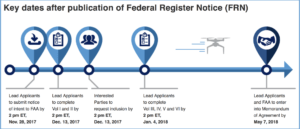 Over 2,800 commercial drone firms have applied to be “interested parties” – partnering with state, local and tribal governments on the UAS Integration Pilot Program.
Over 2,800 commercial drone firms have applied to be “interested parties” – partnering with state, local and tribal governments on the UAS Integration Pilot Program.
The U.S. Department of Transportation (DOT) UAS Integration Pilot Program has generated extreme interest in the drone industry. The program, signed by President Trump last month and launched by Transportation Secretary Elaine Chao, is designed to move drone integration forward in the US and to create a role for state and local governments in drone regulation.
The program calls for state, local or tribal governments to act as “lead applicants” for the program, outlining innovative drone programs that may stretch the boundaries of current regulations. Lead applicants are expected to partner with companies in the drone industry (“interested parties”) to strategize and execute the program; the FAA will work with applicants on receiving the appropriate waivers and authorizations. All participants will contribute feedback on the programs and their effects on local communities to regulators, who will then use the data to develop new commercial drone laws.
Nearly a week after the most recent deadline for the program (lead applicants were required to file a concept overview by December 13) the list of interested parties has grown to 2,821 according to an FAA announcement.
The vast majority of the list is made up of commercial drone operators: but energy firms, police and law enforcement, software providers, drone manufacturers, insurance providers and a vast variety of other players in the drone industry are represented. Among drone operators, the specialties range from straight photography to mapping, surveying, surveillance and every other possibility for aerial data.
The stakes are high for interested parties. While we don’t know yet how many lead applicants will be authorized as part of the program (the FAA says only that the number will be more than 5) those involved will have a unique opportunity to help frame the conversation about regulation with local governments. Partners working with applicants on developing and defining the programs have the chance to educate applicants on the benefits that drone technology has for communities. And the successful execution of the programs may go far in moving drone integration forward.

Miriam McNabb is the Editor-in-Chief of DRONELIFE and CEO of JobForDrones, a professional drone services marketplace, and a fascinated observer of the emerging drone industry and the regulatory environment for drones. Miriam has penned over 3,000 articles focused on the commercial drone space and is an international speaker and recognized figure in the industry. Miriam has a degree from the University of Chicago and over 20 years of experience in high tech sales and marketing for new technologies.
For drone industry consulting or writing, Email Miriam.
TWITTER:@spaldingbarker
Subscribe to DroneLife here.








[…] the US moves forward with the UAS Integration Pilot Program in an effort to involve local governments in drone regulation, the UK is stepping up with the […]